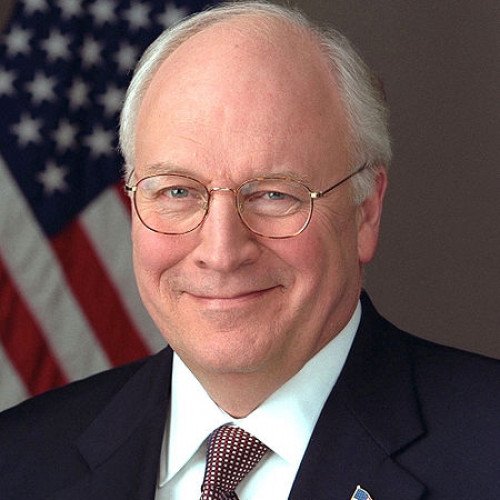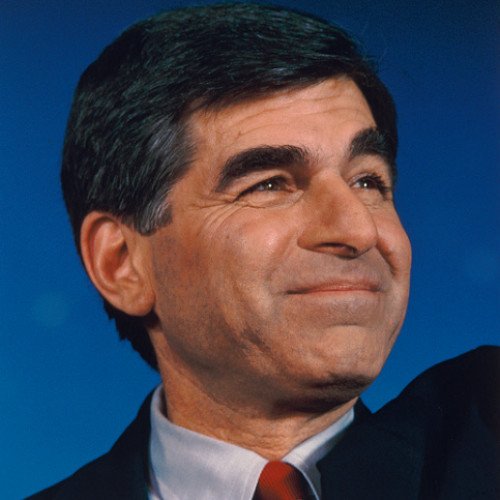Dick Cheney VS Michael Dukakis

Dick Cheney
Richard Bruce Cheney ( CHAY-nee; born January 30, 1941) is an American politician and businessman who served as the 46th vice president of the United States from 2001 to 2009 under George W. Bush. He has been cited as the most powerful vice president in American history. He is also one of the most unpopular politicians in the history of the U.S., holding an approval rating of just 13% at the time of leaving office.Born in Lincoln, Nebraska, Cheney grew up there and later in Casper, Wyoming. He attended Yale and then the University of Wyoming, at the latter of which he earned a BA and an MA in Political Science. He began his political career as an intern for Congressman William A. Steiger, eventually working his way into the White House during the Nixon and Ford administrations. He served as White House chief of staff from 1975 to 1977. In 1978, Cheney was elected to the U.S. House of Representatives. He represented Wyoming's at-large congressional district from 1979 to 1989, briefly serving as House minority whip in 1989. Cheney was selected to be the secretary of defense during the presidency of George H. W. Bush, holding the position for the majority of Bush's term from 1989 to 1993. During his time in the Department of Defense, Cheney oversaw the 1991 Operation Desert Storm, among other actions. Out of office during the Clinton administration, Cheney was the Chairman and CEO of Halliburton Company from 1995 to 2000. In July 2000, Cheney was chosen by presumptive Republican presidential nominee George W. Bush as his running mate in the 2000 presidential election. They defeated their Democratic opponents, incumbent Vice President Al Gore and Senator Joe Lieberman. In 2004 Cheney was reelected to his second term as vice president with Bush as president, defeating their Democratic opponents Senators John Kerry and John Edwards. During Cheney's tenure as vice president, he played a leading behind-the-scenes role in the George W. Bush administration's response to the September 11 attacks and coordination of the Global War on Terrorism. He was an early proponent of invading Iraq, alleging that the Saddam Hussein regime possessed a weapons of mass destruction program (no active WMDs were in Iraq) and the Hussein regime had an operational relationship with Al-Qaeda (even though there was scant credible evidence of such a relationship at the time). He also pressured the intelligence community to provide intelligence consistent with the administration's rationales for invading Iraq. Cheney was often criticized for the Bush Administration's policies regarding the campaign against terrorism, and for his support of wiretapping by the National Security Agency (NSA) and of torture. He became at odds with President Bush's position against same-sex marriage in 2004.
Statistics for this Xoptio

Michael Dukakis
Michael Stanley Dukakis (; born November 3, 1933) is a retired American politician and lawyer who served as the 65th governor of Massachusetts, from 1975 to 1979 and again from 1983 to 1991. He is the longest-serving governor in Massachusetts history and only the second Greek-American governor in U.S. history, after Spiro Agnew. He was nominated by the Democratic Party for president in the 1988 election, losing to the Republican nominee, Vice President George H. W. Bush. Born in Brookline, Massachusetts to Greek and Aromanian Greek immigrants, Dukakis attended Swarthmore College before enlisting in the United States Army. After graduating from Harvard Law School, he won election to the Massachusetts House of Representatives, serving from 1963 to 1971. He won the 1974 Massachusetts gubernatorial election but lost his 1978 bid for re-nomination to Edward J. King. He defeated King in the 1982 gubernatorial primary and served as governor from 1983 to 1991, presiding over a period of economic growth known as the "Massachusetts Miracle". Building on his popularity as governor, Dukakis sought the Democratic presidential nomination for the 1988 presidential election. He prevailed in the Democratic primaries and was formally nominated at the 1988 Democratic National Convention. Dukakis chose Senator Lloyd Bentsen of Texas as his running mate, while the Republicans nominated a ticket consisting of George H. W. Bush and Senator Dan Quayle. Dukakis lost the election, carrying only ten states and Washington, D.C., but he improved on the Democratic performances in the previous two elections. After the election, Dukakis announced that he would not seek another term as governor, and he left office in 1991. Since leaving office, Dukakis has served on the board of directors for Amtrak and has taught political science at Northeastern University and UCLA. He was mentioned as a potential appointee to the Senate in 2009 to fill the vacancy caused by Ted Kennedy's death, but Governor Deval Patrick chose Paul G. Kirk. In 2012, Dukakis backed the successful Senate campaign of Elizabeth Warren.